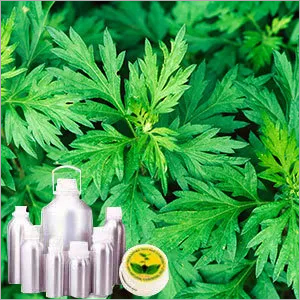Mugwort Oil
 | Botonical Name | : | Artemisia vulgaris |
 | CAS # | : | 8007-46-3 |
 | Country of Origin | : | Morocco |
 | Color & Odor | : | Pale yellow to brownish liquid with fresh-camphoraceous, Strong odor. |
 | Solubility | : | Insoluble in water, soluble in alcohol and oils |
 | Specific Gravity | : | 0.8700 - 0.9270 @ 20°C |
 | Optical Rotation | : | N.A. |
 | Refractive Index | : | 1.3560 - 1.4900 @ 20°C |
 | Flash Point | : | >100°C |
 | Major Constituents | : | a-Pinene, alpha thujone, camphor, cineol,, |
 | Plant Part Used | : | Roots |
 | Extraction Method | : | Steam Distillation |
DESCRIPTION:
Mugwort Oil is derived from the plant Mugwort which belongs to the species of Artemisia vulgaris. Moxa leaves are the main ingredient of the oil and is of light yellow color. In botanical terms the plant is known as Artemisia Absinthium Artemisia Annua. CONSTITUENTS:
alphathujone, camphor, cineol, p-cymene, a-pinene, b-pinene AROMATIC SUMMARY / NOTE / STRENGTH OF AROMA:
A fresh-camphoraceous, Strong odor. BLENDS WITH:
Cedar wood, lavandin, clary sage, patchouli, rosemary, sage. COMMON NAMES:
Artemisia Oil USES:
The oil has several benefits and has been of great usage over decades. Oil is used in cooking which enhances the taste of food and give a tempting smell to your dishes. The oil leaves a calming and soothing effect on one's brain and body. It henceforth is an essential substance for mental illness, stress and anxiety. Having comforted with all the properties, oil detoxifies the blood and certain other parts of body. It stimulates kidney functioning and supports the work of your liver. Medicines having the content of mugwort when consumed helps the consumer to flush out unnecessary salts and toxins of the body. 


































